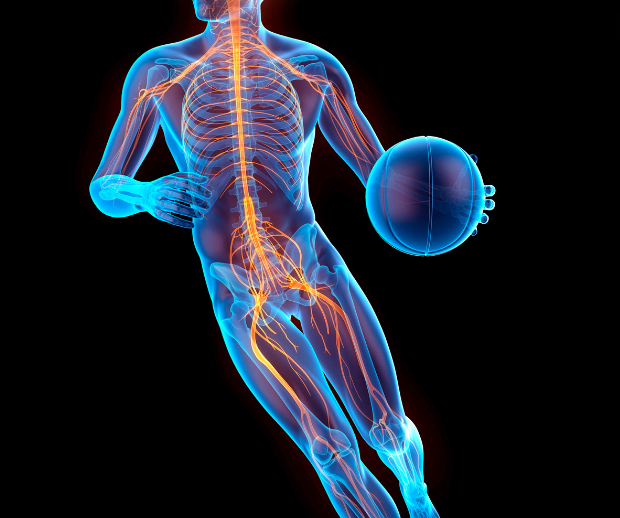Schedule a Pinched Nerve Consultation
What is a Pinched Nerve?
A pinched nerve occurs when a nerve is compressed or irritated by surrounding structures in the body, such as bones, cartilage, muscles, or tendons. This leads to symptoms such as pain, tingling, numbness, or weakness in the area of the nerve.
Pinched nerves can occur in various parts of the body, and the names of the most common pinched nerves typically correspond to the location of the nerve. Each year, 85 out of 100,000 adults in the US suffer from at least one of the most common pinched nerves. Those 50 and older and those suffering from arthritis and spinal degeneration are most often affected.
Which Pinched Nerves Are Most Common?
Pinched nerves can occur in several different areas of the body, and understanding the type of nerve compression you’re experiencing can help you identify the proper treatment method for each patient. Here are the three most common categories of pinched nerves:
Peripheral Nerve Compression
Peripheral nerves run through your arms and legs. These nerves can become compressed at specific points where they pass through tight spaces between muscles, bones, or connective tissue. Common examples include:
- Carpal Tunnel Syndrome – affecting the wrist and hand, especially the thumb, index, and middle fingers.
- Sciatic Nerve Compression – typically from the deep buttock muscles or piriformis, causing shooting leg pain or numbness.
- Tarsal Tunnel Syndrome – involving nerves near the ankle and foot.
- Ulnar Nerve Entrapment – commonly felt from the inside of the elbow down to the pinky finger.
When nerve symptoms affect both sides of the body or multiple limbs, and are caused by conditions like diabetes or chemotherapy, this is referred to as peripheral neuropathy—a more systemic form of nerve damage.
Radiculopathy
Radicular pain, also called radiculopathy or radiculitis, happens when a nerve root near the spine is compressed or inflamed. These nerve roots exit the spinal cord and travel to the arms or legs. When compressed, symptoms may include shooting pain, numbness, or tingling that follows a nerve pathway—often affecting just one or two fingers, or a specific region of the foot. This type of pinched nerve often stems from spinal disc issues like herniation or degeneration.
Central Canal Stenosis
This is the most serious type of pinched nerve and occurs when the spinal cord itself is compressed. Known as central canal stenosis or central stenosis, this condition can impact the entire body below the site of compression. If the spinal cord is pinched in the neck (cervical spine), symptoms may affect everything from the neck down. If the compression occurs in the lower back (lumbar spine), it can impact the legs, feet, and even bowel or bladder control.
Symptoms such as numbness in the saddle area, difficulty walking, or loss of bladder/bowel function may indicate a medical emergency. In these cases, early diagnosis is critical to prevent long-term damage.
Talk to a Pinched Nerve Specialist
What Causes Pinched Nerves?
Understanding the root cause of a pinched nerve is the first step toward effective relief. Whether symptoms develop suddenly or gradually over time, several key factors can contribute to nerve compression, including:
Pressure on the Nerve
Nerves are sensitive to physical compression. When the space around a nerve becomes restricted—due to tight muscles, arthritic bone changes, or bulging spinal discs—nerve irritation and symptoms like pain, numbness, or tingling may follow. Even poor posture or external pressure, like leaning on your elbows for long periods, can compress nerves. A classic example is ulnar nerve pain, which travels from the inner elbow (often referred to as the “funny bone”) down to the pinky finger. Less common but more serious causes, such as cysts, tumors, or infections, also require early evaluation to prevent long-term damage.
Inflammation
Inflammation is a natural part of the body’s healing process—but when it becomes excessive or prolonged, it can irritate nearby nerves. An injured spinal disc, for example, might begin with mild discomfort but lead to nerve pain over several days as inflammation builds. Managing inflammation early can reduce the risk of future chronic nerve irritation.
Scar Tissue Formation
Following injury or surgery, the body forms scar tissue to protect and heal the area. However, over time, this tissue can bind to nearby nerves, creating tension and triggering symptoms. This is especially common in areas with a history of repetitive strain or surgical procedures.
Repetitive Motion
Repeated movement over time can wear down tissue and cause nerves to become irritated. Activities like prolonged typing, assembly work, or using hand tools can strain the arms, wrists, and hands, leading to peripheral nerve compression and symptoms such as numbness, tingling, or weakness.
Schedule a Pinched Nerve Consultation
Where Do Pinched Nerves Occur?
The most common areas types of pinched nerves include:
Neck and Shoulders (Cervical Radiculopathy)
Cervical radiculopathy refers to the compression of a nerve root in the neck area called the cervical spine.
Back and Upper Chest (Thoracic and Lumbar Radiculopathy)
Thoracic and lumbar radiculopathy refer to the compression or irritation of nerve roots in the thoracic (upper back) and lumbar (lower back) regions of the spine, which radiate into surrounding areas of the body like your chest, or down a leg.
Wrist and Hand (Carpal Tunnel Syndrome)
Carpal tunnel syndrome is primarily caused by compression of the median nerve as it passes through the carpal tunnel in the wrist, causing symptoms primarily in your thumb, index and middle fingers, with some nerve symptoms in your ring finger.
Sciatic Nerve (Sciatica)
The sciatic nerve which is the largest nerve in the body, running through your buttock and branching down into the legs. Sciatica occurs when the sciatic nerve becomes compressed, usually due to a herniated disc, spinal stenosis, or injury.
Elbow and Forearm (Ulnar Nerve)
Also, the ulnar nerve is another common pinched nerve, which runs from the neck down into the hand, supplying sensation to the little finger and half of the ring finger. Ulnar neuritis is often caused by the ulnar nerve getting pinched at your elbow.
Can A Chiropractor Help With Pinched Nerve?
Yes, expert chiropractic care can be highly effective in managing and relieving symptoms of pinched nerves. Rather than simply masking pain with medication, chiropractors focus on correcting the underlying issue that’s placing pressure on the nerve. This often involves restoring proper alignment to the spine, improving joint mobility, and relieving muscle tension or inflammation that may be contributing to nerve compression.
Do Pinched Nerves Go Away?
Pinched nerves may go away on their own, but are more likely to return in absence of treatment. Home treatments like rest and over the counter pain medications like ibuprofen or acetaminophen can help with symptom relief. Applying ice to the affected area where the nerve is pinched, along with stretching and rest may help. Ice is typically applied for 10-12 minutes a few times a day. However, if symptoms persist, worsen, or frequently return, it’s important to consult a medical professional to properly diagnose the issue and prevent long-term nerve damage.
Talk to a Pinched Nerve Specialist
What Are The Treatment Options For Pinched Nerves?
Rest and Home Exercises
Avoid strenuous activities like bending, lifting, twisting, or repetitive motions that can irritate the nerves. Resting both the affected areas and minimizing the stress on the compressed nerves is important for the healing process. Walking, swimming, biking or using an elliptical trainer are excellent low impact cardio activities that won’t add stress to the pinched nerve but will speed up the healing process by increasing blood flow and will strengthen muscles. Avoid anything that worsens symptoms.
Chiropractic Care
Chiropractic care for pinched nerves typically involves spinal manipulation and adjustments aimed at reducing pressure on the affected nerve and restoring proper alignment and function. By applying gentle and controlled forces to specific joints or areas where your nerve is pinched, chiropractors aim to improve joint and soft tissue mobility and alleviate nerve compression. Additionally, chiropractors address the underlying issues by providing guidance on posture and ergonomic recommendations, and using nutrition to speed healing.
Massage Therapy
Chiropractors and massage therapists incorporate soft tissue massage and stretching techniques to reduce muscle tension and inflammation around the affected area.
Targeted massage strokes and manipulation of soft tissues, muscles and connective tissue release tightness and improve circulation in the area surrounding the pinched nerve.
Medications and Injections
Over the counter medications can be used to treat symptoms of pinched nerves. N-SAIDS and topical medications may help relieve pain and reduce inflammation, and prescribed muscle relaxants may help to alleviate muscle spasms for increased range of motion. When necessary, doctors also prescribe nerve membrane stabilizers to help alleviate the numbness, tingling, and the pain that pinched nerves cause. A more aggressive strategy for treating severe pinched nerves are steroid injections to reduce inflammation for several months, keeping in mind this is not necessarily a solution, but a faster way to find some relief while you address the underlying cause.
Schedule a Pinched Nerve Consultation
What Are The Long-Term Strategies For Preventing Pinched Nerves?
There are a lot of strategies patients can employ to prevent the most common pinched nerves.
- Maintaining a healthy weight reduces the strain on your spine and joints and decreases the risk of conditions that can lead to pinched nerves.
- Good posture helps maintain proper spinal alignment, reducing the likelihood of nerve impingement.
- Stretching keeps muscles strong and flexible, reducing muscle tension and the risk of nerve compression.
- Avoiding prolonged sitting or lying in one position and taking breaks from repetitive motions can also help prevent nerve compression.
- Using ergonomic equipment, like wrist rests, can further reduce strain on the nerves and muscles.
These strategies, when practiced consistently, can significantly contribute to spinal and joint health and reduce the risk of pinched nerves.
Contact Aligned Medical Group for Pinched Nerve Treatment Options!
Contact the medical team at Aligned Medical Group if the symptoms from your pinched nerves don’t improve with at-home treatment. Our providers treat the pain and work with each patient to find the underlying causes to improve current and future quality of life. Call (610) 644-3166 to schedule a pinched nerve appointment to get back to a pain free lifestyle!


